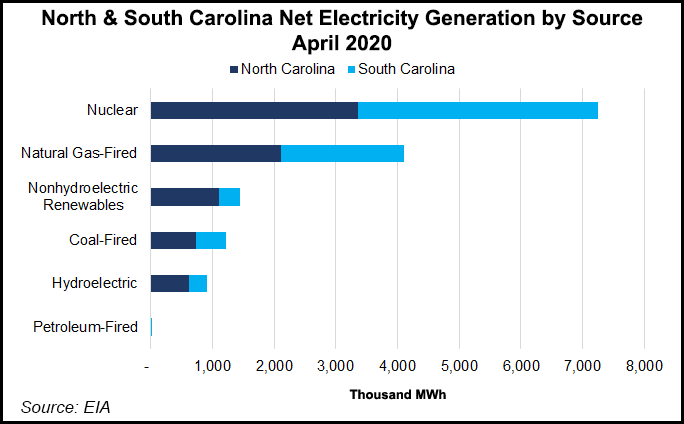Infrastructure | NGI All News Access
Duke Ramps 560 MW Natural Gas-Fired Project to Serve Carolina Customers

Duke Energy Progress, a Duke Energy Corp. subsidiary, said its natural gas-fired Asheville Combined Cycle Station in Arden, NC, is online and producing 560 MW for customers across the Carolinas.
The $817 million natural gas station consists of two 280 MW power blocks, four generators and more than 18,000 components. The first power block became fully operational in December, followed by the second coming online in April.
“By building the new Asheville station, we’re significantly reducing air emissions — including carbon dioxide (CO2), sulfur dioxide and nitrogen oxides — and continuing to move toward our company wide goal of cutting carbon dioxide emissions by 50% by 2030,” said Duke Energy Progress Vice President Kevin Murray, who oversees project management and construction.
The new station generates enough energy to power roughly 450,000 homes, according to Duke.
Construction led to $128 million in work to suppliers in the Carolinas, Florida and the Midwest, as well as $17 million for businesses owned by minorities, women and veterans.
The project also created 1,300 construction jobs, and provided Buncombe County with $1.7 million in new property taxes, bringing the Duke Energy Progress 2019 total property tax bill to $4.4 million.
The Asheville station replaced the 344 MW coal-fired Asheville Plant built in 1964 and retired in January. Most of the 30 employees operating and maintaining the new gas-fired station previously worked at the coal plant.
Duke’s most productive electricity output in the Carolinas now is from the Asheville station and is said to be 75% more efficient than the retired coal plant. According to Duke, Carolina customers benefit from the more efficient station because of lower power plant fuel costs.
CO2 emissions at the site have dropped by about 60%/MWh in comparison to the now-retired coal plant, Duke noted. Sulfur dioxide emissions are projected to decrease by 99%, and nitrogen oxides by 40%. Mercury has also been eliminated.
Duke Energy Progress is in the process of investing more than $175 million in western North Carolina to upgrade power lines, electrical substations and more equipment. Additionally, the company is also investing $120 million for renewable energy projects in the region. The projects include building a 9-10 MW solar plant with a 17-18 MW battery storage facility at the Asheville station as soon as the retired coal plant is deconstructed.
Further, the company plans to connect a 9 MW lithium-ion battery facility to the company’s Rock Hill substation in the city of Asheville. It also is working to construct a microgrid with a 2 MW solar plant and a 4 MW lithium-ion battery storage facility in Hot Springs.
© 2024 Natural Gas Intelligence. All rights reserved.
ISSN © 1532-1231 | ISSN © 2577-9877 |


